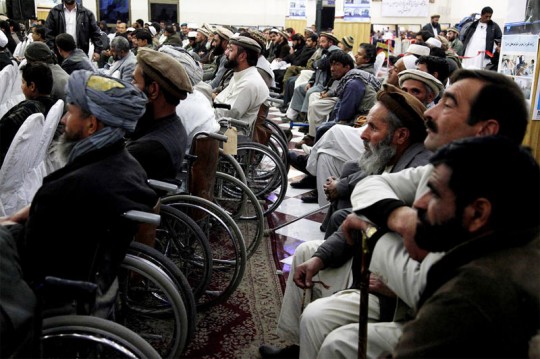UN welcomes Iraqi ratification of pact on rights of persons with disabilities
UN welcomes Iraqi ratification of pact on rights of persons with disabilities
 Celebration of International Day of Persons with Disabilities. UN Photo/Fardin Waezi
Celebration of International Day of Persons with Disabilities. UN Photo/Fardin Waezi
30 January 2012
The Convention on the Rights of Persons with Disabilities, ratified last week by the Iraqi Government, covers a number of key areas such as accessibility, personal mobility, health, education, employment, habilitation and rehabilitation, participation in political life, and equality and non-discrimination.
“The ratification of this convention by Iraq marks a historic step in ensuring that persons living with disabilities enjoy full participation in the Iraqi society and can contribute to the community to their full potential,” said Francesco Motta, chief of the human rights unit of the UN Assistance Mission for Iraq (UNAMI) and Representative of the UN High Commissioner for Human Rights (OHCHR) in Iraq.
Mr. Motta stressed that the ratification represents the Government’s recognition of the “potential contribution which persons with disabilities can make to society if given the same opportunities enjoyed by other Iraqi citizens.”
UNAMI noted in a news release that the ratification requires Iraq to introduce measures such as anti-discrimination legislation, the elimination of laws and practices that discriminate against persons with disabilities, and considering these persons when adopting new policies and programmes. Other measures include making services, goods and facilities accessible to them.
“The important thing now is for the Government of Iraq to ensure that the provisions of the convention are implemented,” Mr. Motta said. “The best way to do this is in consultation with civil society organizations and representatives of people with disabilities so as to ensure that measures taken to implement the convention promote and protect their right to participate equally in the economic, social and political life of Iraqi society without discrimination.”
###
> United Nations (UN).
 The United Nations was established on 24 October 1945 by 51 countries committed to preserving peace through international cooperation and collective security. Today, nearly every nation in the world belongs to the UN: membership totals 192 countries.
The United Nations was established on 24 October 1945 by 51 countries committed to preserving peace through international cooperation and collective security. Today, nearly every nation in the world belongs to the UN: membership totals 192 countries.
When States become Members of the United Nations, they agree to accept the obligations of the UN Charter, an international treaty that sets out basic principles of international relations. According to the Charter, the UN has four purposes:
- to maintain international peace and security;
- to develop friendly relations among nations;
- to cooperate in solving international problems and in promoting respect for human rights;
- and to be a centre for harmonizing the actions of nations.
###
* The above story is adapted from materials provided by United Nations (UN)
** More information at United Nations (UN)




















